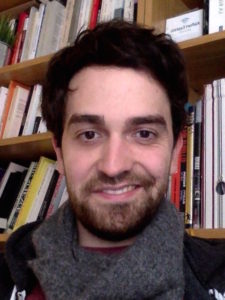Program on Science, Technology and Society at HarvardHarvard Kennedy School of Government | Harvard University |
|||||||||
|
|
Henri Boullier is a post-doctoral fellow at Cermes3, the Center for research in medicine, science, health, and society. He is a sociologist and ethnographer of administrative work, interested in the social construction of risks, how regulatory knowledge is produced and the role played by firms in the making of regulatory science and decisions. He was a Visiting Fellow with the Program on Science, Technology and Society (STS) at the Harvard Kennedy School of Government in 2011-2012. While a visiting fellow at Harvard, Henri looked at the role of scientific expertise in the production of regulatory knowledge and how it questions the ways in which agencies like the US EPA or ECHA articulate knowledge-production and the production of governance norms. In particular, he investigated the creation, and retraced the day-to-day work, of the Environmental Protection Agency’s OPPT, the Office of Pollution Prevention and Toxics. He also wrote on the regulatory trajectories of chemical substances, in the context of the European REACH regulation as they were measured, handled, understood and regulated in different ways depending on different interpretations, regulatory instruments and local organizations’ and actors’s practices. These investigations were part of his doctoral research, which he presented in January 2016, and his visit with the Harvard STS Program was funded by a fellowship from the French Institute for Research, Innovation and Society (IFRIS), PRES Université Paris-Est and the LATTS research group on technology, territories and societies. Since he joined Cermes3 on a IFRIS grant, Henri has been working on a project entitled “Trading Rats for Maths. How Regulatory Science Tackles Toxic Ignorance with Alternative Methods and Economic Analysis”. This project looks at the emergence of a “new regulatory toxicology” that places calculation and valuation at the heart of expertise. The shift to alternative toxicological methods, like quantitative structure-activity relationships (QSAR) models, and economic analysis, profoundly modifies the nature and hierarchy of regulatory knowledge produced in the assessment of industrial chemicals. This research consequently studies how scientists from U.S. federal agencies, the European Chemicals Agency, the OECD, and more importantly from chemical companies, have managed to impose these alternative methods and make them legitimate substitutes to in vivo studies, the classical ‘gold standard’ of toxicological testing. Publications : BOULLIER Henri (2016), « Évaluer des dossiers “vides”: L’expertise REACH face aux asymétries d’information », Terrains & travaux, n°28, p. 41‑61. BOULLIER Henri (2016), « Gouverner les molécules « sans données ». Généalogie de l’interdiction par l’autorisation dans REACH », Annales des Mines – Gérer et comprendre, n°126, p. 61‑70. BOULLIER Henri & LAURENT Brice (2015), « La précaution réglementaire: Un mode européen de gouvernement des objets techniques », Politique européenne, vol. 49, n°3, p. 30. p on technology, territories and societies.
Note: The above information concerns a past fellow at the Program on Science, Technology, and Society at the Harvard Kennedy School. It does not constituent evidence of current enrollment. The information may be out of date. To update their information, past fellows should e-mail the site administrator.
|
||||||||
